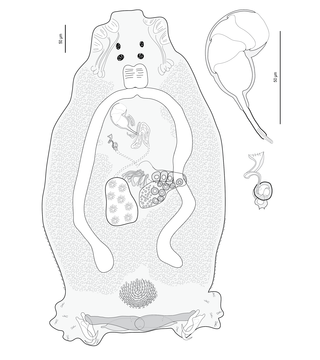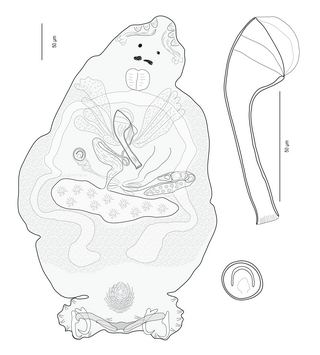Pseudorhabdosynochus auitoe is a diplectanid monogenean parasitic on the gills of the Highfin grouper, Epinephelus maculatus. It was described in 2007.
Pseudorhabdosynochus buitoe is a diplectanid monogenean parasitic on the gills of the Highfin grouper, Epinephelus maculatus. It has been described in 2007.
Pseudorhabdosynochus cuitoe is a diplectanid monogenean parasitic on the gills of the Highfin grouper, Epinephelus maculatus. It has been described in 2007.
Pseudorhabdosynochus duitoe is a diplectanid monogenean parasitic on the gills of the highfin grouper, Epinephelus maculatus. It has been described in 2007.
Pseudorhabdosynochus euitoe is a diplectanid monogenean parasitic on the gills of the Highfin grouper, Epinephelus maculatus. It has been described in 2007.
Pseudorhabdosynochus fuitoe is a diplectanid monogenean parasitic on the gills of the highfin grouper, Epinephelus maculatus. It has been described in 2007.
Pseudorhabdosynochus huitoe is a diplectanid monogenean parasitic on the gills of the highfin grouper, Epinephelus maculatus. It was described in 2007.

Pseudorhabdosynochus malabaricus is a diplectanid monogenean parasitic on the gills of the malabar grouper, Epinephelus malabaricus. It has been described in 2007.

Pseudorhabdosynochus maternus is a diplectanid monogenean parasitic on the gills of the Malabar grouper, Epinephelus malabaricus. It has been described in 2007.

Pseudorhabdosynochus manipulus is a diplectanid monogenean parasitic on the gills of the malabar grouper, Epinephelus malabaricus. It was first described in 2007.
Pseudorhabdosynochus inversus is a diplectanid monogenean parasitic on the gills of the halfmoon grouper, Epinephelus rivulatus. It was described in 2008, from only three specimens.
Pseudorhabdosynochus quadratus is a species of diplectanid monogenean that is parasitic on the gills of the white-streaked grouper Epinephelus ongus. It was described in 2011.
Pseudorhabdosynochus chauveti is a species of diplectanid monogenean that is parasitic on the gills of the blue grouper Epinephelus cyanopodus. It was described in 2008.
Pseudorhabdosynochus cyanopodus is a species of diplectanid monogenean that is parasitic on the gills of the blue grouper Epinephelus cyanopodus. It was described in 2008.
Pseudorhabdosynochus podocyanus is a species of diplectanid monogenean that is parasitic on the gills of the blue grouper Epinephelus cyanopodus. It was described in 2008.
Pseudorhabdosynochus crassus is a species of diplectanid monogenean that is parasitic on the gills of the camouflage grouper Epinephelus polyphekadion. It was described in 2011.
Pseudorhabdosynochus dionysos is a species of diplectanid monogenean that is parasitic on the gills of the camouflage grouper Epinephelus polyphekadion. It was described in 2011.
Pseudorhabdosynochus viscosus is a species of diplectanid monogenean that is parasitic on the gills of the camouflage grouper Epinephelus polyphekadion. It was described in 2011.
Pseudorhabdosynochus exoticoides is a species of diplectanid monogenean that is parasitic on the gills of the brownspotted grouper Epinephelus chlorostigma. It was described in 2010.

Laticola dae is a species of diplectanid monogenean. It is parasitic on the gills of the Highfin grouper, Epinephelus maculatus. It was described in 2006. The species is a member of the genus Laticola Yang, Kritsky, Sun, Zhang, Shi & Agrawal, 2006. More than 400 specimens of this parasite were studied for the description of the species, which was the most abundant monogenean species, representing about 50% of the specimens found on this fish.




